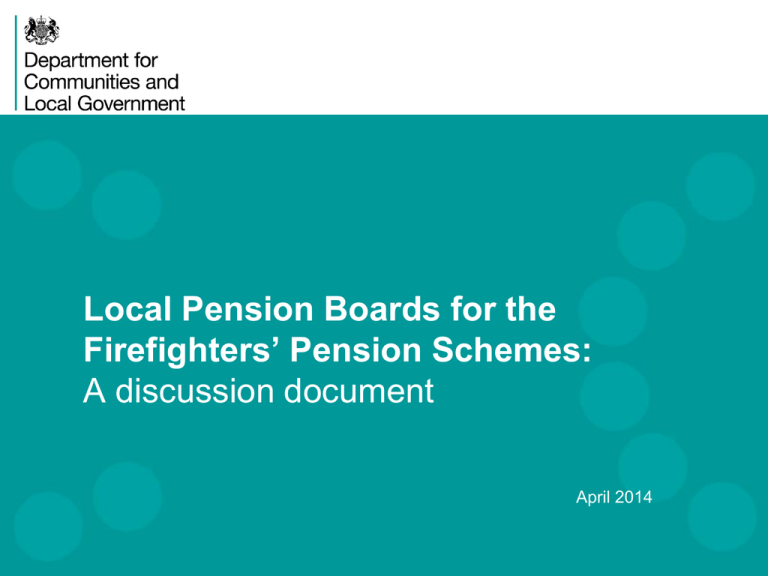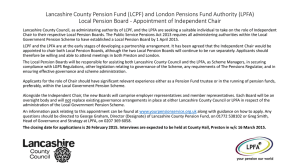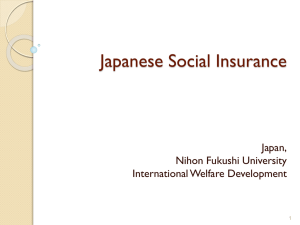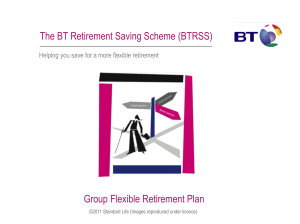FPC(14)8 - pension boards - discussion document
advertisement

Local Pension Boards for the Firefighters’ Pension Schemes: A discussion document April 2014 Public Service Pensions Act requirements The Public Service Pensions Act 2013 provides (but is not limited to): • specified individuals to make scheme regulations (“responsible authority”) • for a person(s) to be responsible for managing or administering the scheme (“scheme manager”) • for the establishment of a “pension board” with responsibility for assisting the scheme manager(s) • for the establishment of a board (“scheme advisory board”) with responsibility for providing advice to the responsible authority on the desirability of scheme changes • for regulations allowing the scheme advisory board to provide advice to scheme managers or pension boards on the effective and efficient administration and management of the scheme • for the responsible authority, scheme manager or pension board to have regard to any advice given by the scheme advisory board • that the Secretary of State may delegate any function under the regulations. 2 Governance structure Secretary of State (‘Responsible authority’) Responsible for: • making scheme regulations • commissioning scheme valuations • undertaking statutory functions Scheme Advisory Board The Pensions Regulator Responsible for oversight of the governance and administration of public service pension schemes. Advisory Committee, responsible for: • proposing scheme amendments to the responsible authority • providing advice to pension boards and scheme managers on the effective and efficient management and administration of schemes Fire and Rescue Authority Pension Boards (‘Scheme manager’) Scheme manager, and responsible for delivery of the firefighters’ pension scheme. Responsible for advising the Scheme Manager on: • securing compliance with scheme legislation and codes of practice • the efficient and effective administration of the scheme • the financial management of the local pension fund, and risk management and internal controls. Pension Boards The Act requires that scheme regulations provide for the establishment of a board with responsibility for assisting the scheme manager in relation to: • securing compliance with the scheme regulations, other legislation, and any requirements imposed by the Pensions Regulator • any such other matters as the scheme regulations may specify. In making regulations, the responsible authority must have regard to securing the effective and efficient governance and administration of the scheme. In addition to the above items, what activities should pension boards be required to undertake, for instance: - to provide assurance about effective risk management and financial and internal controls - to benchmark against other similar scheme managers - to provide assurance on service or data quality? Are there activities which pension boards should be restricted from taking? 4 Joining up pension boards There are a range of potential options for pension boards: • one board per scheme manager • ‘horizontal’ integration – for instance by geographical location, by administrative supplier (e.g. Mouchel, Capita), etc • ‘vertical’ integration – combining with police/local authorities in a single area. Whilst there may be efficiency benefits of joining-up pension boards, boards will need to be close enough to each scheme manager to maintain effective oversight of local governance and administration. How might this be achieved if there are joint boards? How prescriptive should the regulations be on how many scheme managers a pension board can service? Should there be an approval mechanism or guidance issued by the Scheme Advisory Board or Secretary of State with key tests that should be satisfied? 5 Membership The Act requires that the pension board must have equal numbers of ‘scheme member’ and ‘employer representatives’. Scheme member representatives do not have to be trade union representatives or scheme members. Similarly employer representatives do not have to be councillors or employees of the employer. In both instances they must be able to represent their specific interests. Furthermore, there can be additional independent members who are neither scheme member or employer representatives. Should the regulations or guidance specify: • the type of individuals who are eligible to be board representatives • the type of individuals who are not eligible to be board representatives • the maximum and minimum number of members to the board • whether there should be independent members with specified expertise • whether members are voting members or non-voting members? 6 Appointment It will be for the scheme manager to formally appoint all board members, although there will need to be a procedure for doing so. Should the regulations, or guidance, specify: • procedures for appointing representatives and the chair • a maximum term of office for board members • staggered appointments, to secure continuity of knowledge and experience • procedures for removing representatives? 7 Conflicts of interest Scheme managers will need to be satisfied that a person appointed to the pension board has no conflict of interest. The regulations will require prospective or current members of the pension board to provide scheme managers with any reasonable information necessary to check conflicts of interest. The Pension Regulator’s Code of Practice covers conflicts of interest. Is there a need for bespoke guidance for pension boards in the fire service? Who is best placed to prepare this? Do the regulations need to specify any other statutory requirements in addition to conflict of interest? 8 Knowledge and Understanding Each member of a pension board is required to be conversant with: • the rules of the scheme • any document recording policy about the administration of the scheme which is for the time being adopted in relation to the scheme; • the law relating to pensions • any such other matters as may be prescribed in regulations. The Pension Regulator’s Code of Practice covers knowledge and understanding and will be provide an equivalent ‘trustee toolkit’ for public service pension schemes. Are there any other requirements which should be prescribed in regulations or guidance? What sort of training should be provided to prospective board members and what format should that take? 9 Transparency The regulations must provide for scheme managers to publish the following information about the pension board: • representation on the board of members of the scheme or schemes • the matters falling within the board's responsibility. Should the regulations, or guidance, require the publication of other materials, for instance: • minutes of meetings • scheme data • benchmarking data • appointment process? Should the regulations also specify that the local pension board has a right of access to information from the scheme manager? 10 Funding The Department is prepared to consider funding certain administrative and governance costs via the top-up grant process which could include: • the Scheme Advisory Board (members’ salary/expenses, secretariat, running costs) • the pension board (members’ salary/expenses, secretariat, running costs etc) • external advice/experts provided to these boards, and • The administrative costs of linking pension boards up. These costs would then be recovered through employer contribution rates. However, for valuation purposes, the governance costs would be disaggregated from the cost of pension benefits. Should the scheme allow costs to be recovered via employer contribution rates and which costs should be permitted? 11 Next steps The Department would be grateful for comments by Friday 2 May on the options and questions in this document and any other relevant points. These comments will inform a more detailed paper which will be discussed in May at a meeting with interested parties. The intention is for formal proposals to be published, for consultation, before summer. 12





